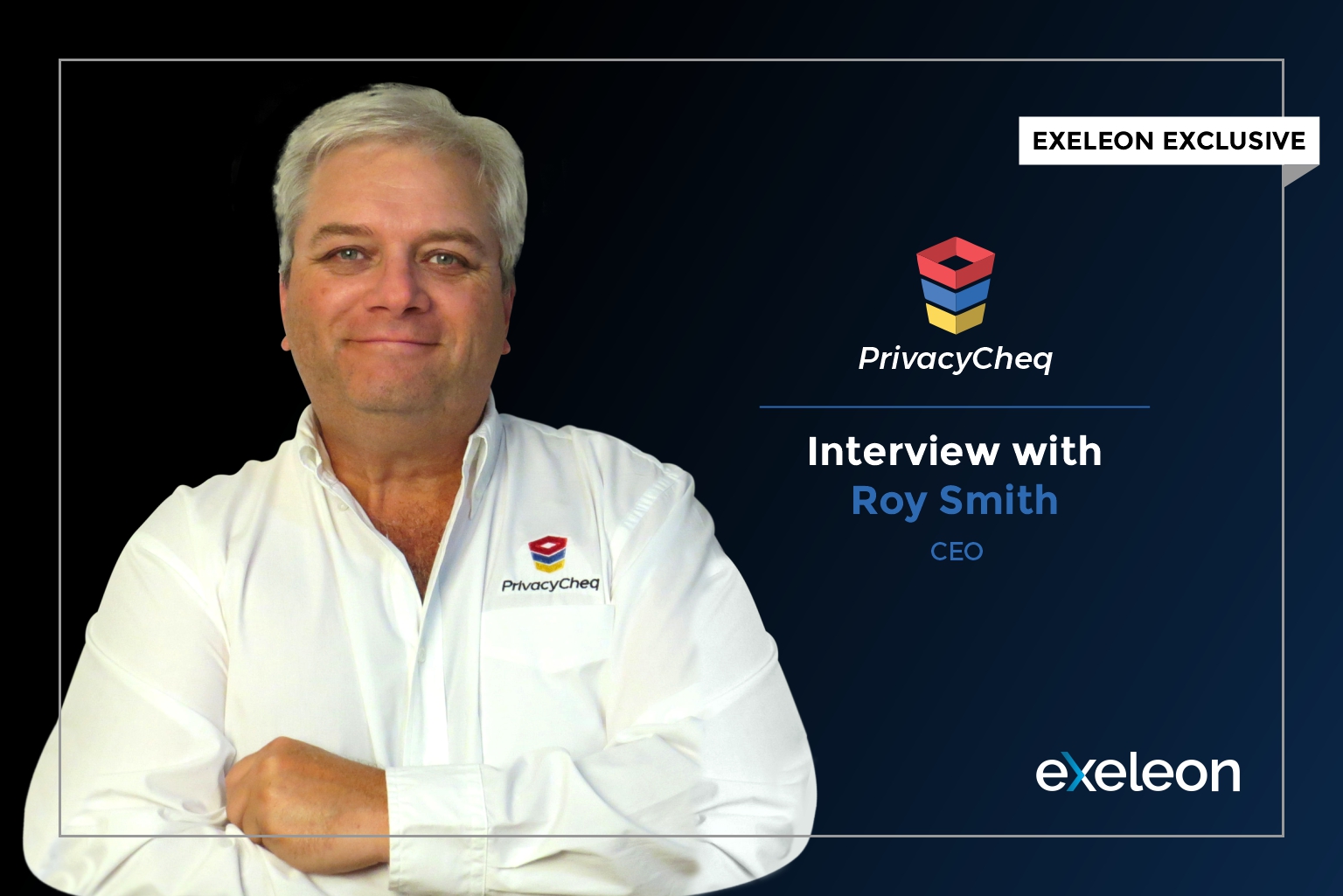
With more people across the globe connected to the World Wide Web through various devices, the term “digital privacy” has become increasingly prevalent. The risk associated with privacy has prompted the emergence of many companies and innovative minds. However, only a few among the same have been able to bring-forth solutions that ensures “digital trust.”
One company that enables the same through its solutions is PrivacyCheq. Led by a serial entrepreneur and veteran in the field of technology, Roy Smith, the company has been riding on the wave of Privacy Tsunami to develop privacy enhancing technologies.
Exeleon Magazine caught up with the CEO of PrivacyCheq, Roy Smith, in an Exclusive Interview to discuss about the company’s journey, future market outlook, and disruption.
What prompted the inception of PrivacyCheq? What led to the rebranding of the company back in 2015?
In 2012, Congress beefed up the US Child Privacy Protection law (known as COPPA), specifically addressing the egregious privacy offenses of the newly popular mobile video games – Candy Crush, Angry Birds, etc.
At the time, those games were riding the explosion of smartphones and were generating $15B in revenue (Today, the same market generates $49B worldwide). We believed that the mobile game market was facing a huge disruption of privacy enforcement and created a SaaS “pain relief” solution that was specifically designed to streamline and ease the burden of COPPA compliance for these game publishers.
The company was founded under the name “AgeCheq”, which referred to COPPA’s targeting of children under 13. Two years later when we realized there was a wave of similar privacy regulations coming all around the world, we rebranded to “PrivacyCheq” as a more broadly descriptive branding.
What according to you makes a company disruptive?
In my opinion, companies are very rarely disruptive – megatrends create disruption and companies like ours use those disruptions as a source of opportunity – new problems to be solved, new activities that must be undertaken, etc. The term “disruptive” refers to the status quo which breaks down.
What is your day-to-day role as the CEO of PrivacyCheq? Briefly highlight your experience and vision.
Although I have been an engineer and written code, my role here is strategy and marketing. Since co-founding Turtle Beach Systems (NASD:HEAR) in 1985, I’ve always focused on branding and marketing issues, which I continue to do at PrivacyCheq.
With regard to strategy, the privacy tsunami has created a regulatory compliance space that is very disjointed, and recently vast sums of venture capital are flowing in (for example OneTrust’s $200M raise last summer). At 6 years in, with a mature, proven scalable consent ecosystem, we are unique in our space and are fielding quite a few partnering and M&A bids as these VC funded companies look to build complete solutions.
Looking back at your career, what would you have done different when starting out?
I’m pretty happy with the path that’s led me here. I was very lucky to be in a position to capitalize on big disruptions three times in my career – the “PC revolution”, the “smartphone”, and now the “privacy tsunami”.
How has the concept of privacy changed over the years? How does PrivacyCheq help in curbing down privacy related issues?
I think the average person is just now beginning to understand the value of their digital privacy. When you search for “lawn mower blades” on your smartphone and then see ads for mower blades for the next six weeks, it’s pretty obvious what’s happening. The dark sides to this surveillance and tracking world are very troubling, and I’m pleased to be a part of reigning in the privacy leakages of today’s digital economy by giving users a clear understanding of what they are signing up for, and also a clear way to exert control to stop their private data from being exploited.
Explain the benefits offered by the PrivacyCheq Platform? What makes the company stand out from its competition?
All of these new privacy regulations require users to be given clear understanding of what they are signing up for before their data is captured. If they consent, their private data can be used as the company described. However, the user can change their mind at any time, so the consent must be verified every time it is processed – a big operational change. Adding complexity, when user data is shared with third parties (extremely typical in modern business), the user’s consent must be verifiable by the “downstream” partners every time before they process it. Our tech facilitates all of this operational complexity in a scalable, global enterprise way.
We have two “special sauces” that I believe make us stand out. First is the fact that while competitors have focused on cookie issues that only pertain to websites and advertising, our platform has been designed to service all of the ways enterprises gather and use data – via web, mobile apps, email marketing, telemarketing, voice command, and even “session-less” privacy gathering from IOT devices and in physical locations like retail and hospitality where video surveillance, Wi-Fi and phone tracking and facial recognition are used. Gartner and Forrester have each noted this difference in their analysis.
Secondly, we are the only consent management service that has focused on delivering the best user experience as a driver of trust. Users who a delighted by the privacy tools and information will give their consent at a much higher rate than people who are tricked into consenting through obfuscation or “dark patterns” favored by our competitors. We’ve innovated extensively along these lines, designing for mobile use, using the “Nutrition Facts” paradigm for privacy education, using text messaging and QR codes to ease the friction of consent.
What is the process followed by PrivacyCheq when offering its services? How does it ensure ‘digital trust’?
We offer our services but do not proscribe the exact implementation of them, a lesson learned in many years of doing this. Every enterprise presents a different set of use cases and we’ve been able to create a super flexible product that can handle any set of requirements. It is up to our customer to determine the exact compliance strategy they wish to pursue using our tech.
What has the journey been like for you as a serial entrepreneur with more than 35 years of experience?
Starting from the dawn of the PC in 1981, I’ve seen the capital, infrastructure and tech resources needed to create valuable companies continually get easier and cheaper, a variation of “Moore’s Law”. The difference between launching a tech startup in 1985 and 2020 could not be more extreme.
What has been the biggest challenge for the company thus far? What challenges are you potentially expecting to face in the future?
We solve a problem that requires enterprises to allocate budget to improve their privacy stance for one of two reasons. Either they believe they can gain a competitive advantage by providing their customers with a much better privacy experience than their competitors, or they fear what might happen if a regulator forced them to pay a huge career-ending fine for inaction on privacy. So we do not have a direct motivating lever for our sales growth, we have had to wait several years while the privacy tsunami has come ashore, driving both of the above.
When we are able to show our service to interested enterprises, we usually prevail. I believe the “waiting period” will come to an end in 2020, as real, meaningful enforcement of CCPA, GDPR and even COPPA continues to ramp up.
For a company to be disruptive, is being innovative important? If so, why?
Truly “disruptive” companies do so by defying the status quo. For example Tesla. I can’t think of any disruptive company that wasn’t innovative.
How do you plan to take the company forward? On a personal front, where do you see yourself standing in the coming years?
We have been waiting for the Privacy Tsunami for several years and now that it’s here, we intend to deploy our user-focused privacy tools to the largest audiences possible. There are dozens of consumer platforms across the world with hundreds of millions of users, all requiring an easy way to manage their privacy preferences under these new global regulations in place today and pending.
Personally, I’ll be enjoying watching the pendulum of personal privacy swinging back toward the individual as the privacy tsunami continues to roll ashore.
Magazine Link – Read Here









